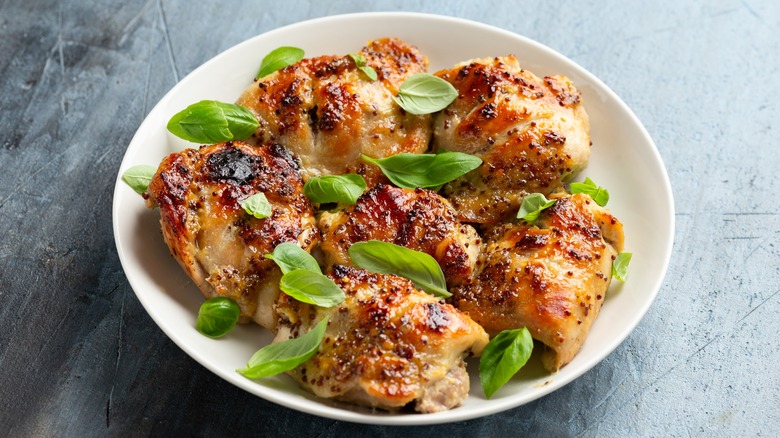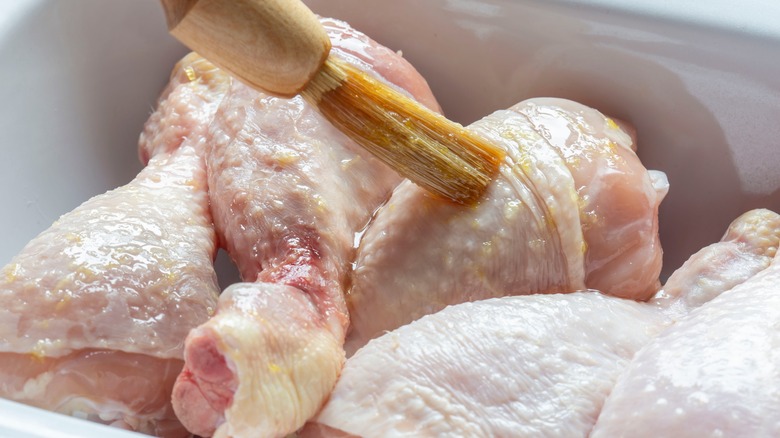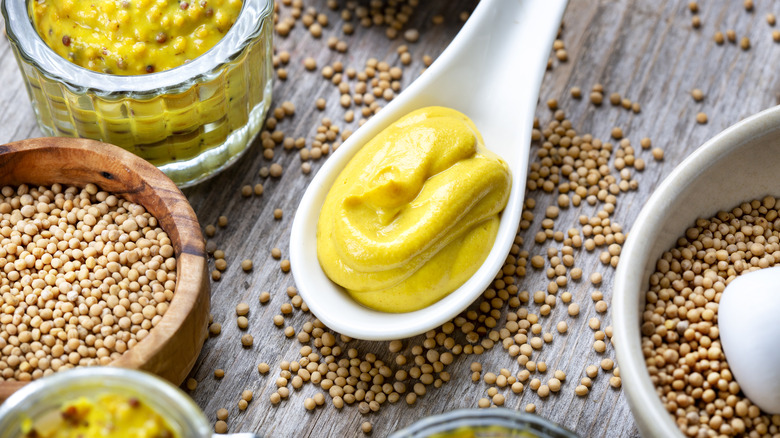The Condiment You Desperately Need For Great Baked Chicken
Home cooks are always looking for new and exciting ways to bake a chicken, but as the saying goes "everything old is new again." Instead of looking forward, there's plenty of inspiration to be found by glancing back at the chefs and dishes that have stood the test of time. Julia Child — queen of cooking tips, television personality, and co-author of perhaps one of the most famous cookbooks in American history, "Mastering the Art of French Cooking" – liked to make poulet grillé á la diable (the devil's roast chicken), a recipe that features a hefty helping of one essential condiment: mustard.
In episode 25 of her famed PBS cooking show "The French Chef," titled "Broiled Chicken Plain and Saucy," Child shows how to make her devilish chicken, a recipe she claims to be one of her most favorite. She teaches the audience how to paint the chicken mid-broil with ⅓ cup Dijon mustard mixed with thyme, Tabasco sauce, chopped shallots, and basting juices, finishing with a layer of breadcrumbs before returning the chicken back to the broiler. Luckily, it's incredibly easy to apply Child's culinary know-how to your own baked chicken for fantastic results.
Using mustard with baked chicken
The effectiveness of adding mustard to your baked chicken recipe is two-fold. First, acidity, specifically the white distilled vinegar in yellow mustard, is an excellent tenderizer. For example, using citrus juice or buttermilk marinades will cause chicken to become more tender and juicy in a short amount of time. Secondly, mustard imparts incredible flavor, that earthy, tangy heat you so love on your hot dog or burger is equally delectable on baked chicken.
When baking a chicken, as opposed to broiling it like in Julia's demonstration, the preparation is even simpler. Regardless of whether you're baking a whole chicken or just pieces (thighs, breasts, tenders), salt and pepper both sides and then brush on a liberal amount of mustard (approximately ⅓ cup for every 5 to 6 pounds of chicken) mixed with fat (olive oil, butter, lard) and whatever seasonings you typically use such as thyme, rosemary, sage, marjoram and nutmeg before popping it into the oven.
The right mustard for your baked chicken
The condiment aisle in your local grocery store offers a veritable smorgasbord of mustards to choose from, so which one is right for your baked chicken? Oftentimes, recipes call for Dijon mustard (Julia Child's does), a spicier mixture than the American favorite yellow mustard, Dijon has a brown mustard seed base blended with Chardonnay. But if French's Yellow Mustard is what you have sitting in the door of your refrigerator, then use it! French's is mainly comprised of white distilled vinegar, white or yellow mustard seeds, paprika and turmeric, which gives it that brilliant yellow color and peppery flavor. Keep in mind that mustard's distinct sharpness will mellow after baking, while still elevating the flavor of your baked chicken with earthy hints of heat and a touch of tartness from the vinegar.
Other mustard varieties will obviously offer different flavor profiles. Honey mustard will offer a sweetness to your baked chicken while hot mustards with added jalapeño or horseradish will kick up the heat. Bourbon or whiskey-blended mustards with brown sugar or molasses add a rich, syrupy flavor, while whole grain mustard (commonly reserved for sandwiches) provide plenty of texture and pops of heat. Experiment at will and you're sure to find one that cuts the mustard.


